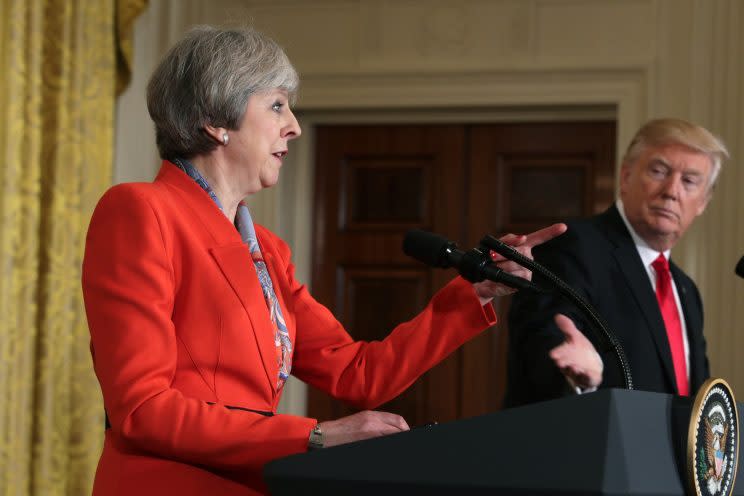Trump won’t say if he’ll ease sanctions on Russia, but wants a ‘great relationship’
President Trump told reporters on Friday that he wants a “great relationship” with Russia, but declined to say whether he has decided to ease U.S. sanctions imposed on Russia to punish Moscow for the invasion of Ukraine. Trump spoke at a joint press conference with British Prime Minister Theresa May, who made clear that her country opposes loosening the economic vise on Vladimir Putin’s government.
“As far as the sanctions, [it’s] very early to be talking about that,” said Trump, who is scheduled to speak with Putin on Saturday. “If we can have a great relationship with Russia and with China, and with all countries, I’m all for that. That would be a tremendous asset,” he added. “No guarantees, but if we can, that would be a positive, not a negative. OK?”
May, the first foreign leader to visit the White House since the president’s Jan. 20 inauguration, said London wants to keep Western sanctions on Russia until that country abides by an agreement to end its incursion in eastern Ukraine.
“We believe the sanctions should continue until we see that Minsk Agreement fully implemented, and we’ve been continuing to argue that inside the European Union,” she said.
Trump also said that he believes that torture works but will defer to Defense Secretary James Mattis, who is known to fiercely oppose the practice as illegal and ineffective.
“I don’t necessarily agree, but I would tell you that he will override because I’m giving him that power,” Trump said. “I happen to feel that it does work. … We’re going to win with or without.”
Trump also confirmed that he had spoken by phone earlier in the day with Mexican President Enrique Peña Nieto, who on Thursday abruptly canceled a visit to the United States. The announcement came amid an escalating spat over the U.S. leader’s plan to build a border wall paid for by the United States’ southern neighbor.
“We are going to be working on a fair relationship and a new relationship,” said Trump, who charged that Mexico “beat us to a pulp” in past trade negotiations and again vowed to renegotiate the North American Free Trade Agreement (NAFTA), which binds the United States, Canada and Mexico. “But it was a very, very friendly call,” he said.
May revealed that she had passed along an invitation from Queen Elizabeth II for Trump to visit Britain later this year, and that the president had accepted.
The president, making his first real foray on the world stage since his inauguration, left it to May during opening statements to delve into the policy details of their previous, private conversation. But while taking reporters’ questions with the prime minister, he delivered a full-throated endorsement of Britain’s vote to leave the European Union, popularly known as “Brexit.”
“Brexit’s going to be a wonderful thing for your country,” he said. “It will end up being a fantastic thing for the United Kingdom. I think in the end, it will be a tremendous asset, not a tremendous liability.”
Standing side by side in the White House’s ornate East Room, a typical backdrop for a presidential press conference, the two leaders played down their differences on issues like sanctions against Russia and played up their personal chemistry.
“There will be times when we disagree and issues on which we disagree. The point of the special relationship is that we are able to have that open and frank discussion,” May said, using the traditional two-word description for the United States’ closest alliance.
A British reporter asked how May, “the hard-working daughter of a vicar,” and Trump, “the brash TV extrovert,” would get along.
“Actually, I’m not as brash as you might think,” Trump said, drawing laughter from the crowd.
May seemed to try to reassure European leaders fearful that the new president is not committed to NATO. Trump has repeatedly called the alliance “obsolete” and ill-suited to battling terrorism. He has also suggested that he would only enforce its core mutual defense agreement for countries that have met the pledge to spend 2 percent of their gross domestic product on defense.
“We are united in our recognition of NATO as the bulwark of our collective defense, and today we’ve reaffirmed our unshakable commitment to this alliance,” the prime minister said, describing Trump as “100 percent behind NATO.”

Top Trump staffers packed the first two rows of seats at the press conference, including White House Chief of Staff Reince Priebus; top advisers Steve Bannon and Kellyanne Conway; Trump’s son-in-law, Jared Kushner; policy aide Stephen Miller; communications strategist Hope Hicks and press secretary Sean Spicer.
Throughout the presidential campaign, Trump made clear his admiration for Putin and eagerness for better relations with Moscow. U.S. intelligence agencies have accused Russia of trying to shape the election by hacking and releasing the emails of Democratic political figures tied to Hillary Clinton. And U.S. authorities are reportedly investigating top figures in Trump’s orbit for potentially inappropriate connections with Russian officials.
Trump aides have made little secret of the fact that he could opt to ease U.S. sanctions imposed on Russia over its invasion of Ukraine and annexation of that country’s Crimea region.
Conway told Fox News on Friday that lifting sanctions “is under consideration.”
But many Republicans, who see Putin as a de facto enemy of the United States, have vowed to oppose any attempt to lessen economic pressure on Moscow.
“For the sake of America’s national security and that of our allies, I hope President Trump will put an end to this speculation and reject such a reckless course,” Senate Armed Services Committee Chairman John McCain said Friday. “If he does not, I will work with my colleagues to codify sanctions against Russia into law.”
Read more from Yahoo News:


